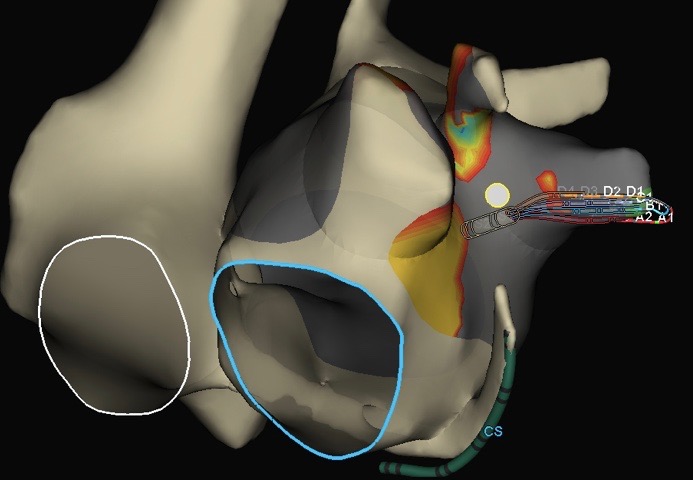#301 How Successful are Atrial Fibrillation Ablations?
 Dr. John Day
Dr. John DayDr. Day is a cardiologist specializing in heart rhythm abnormalities at St. Mark’s Hospital in Salt Lake City, Utah. He graduated from Johns Hopkins Medical School and completed his residency and fellowships in cardiology and cardiac electrophysiology at Stanford University. He is the former president of the Heart Rhythm Society and the Utah chapter of the American College of Cardiology. |

How Successful are Atrial Fibrillation Ablations?
Atrial fibrillation ablations may be the answer to when your heart is pounding away uncontrollably at 130, 140, or faster than 150 beats per minute and medications are no longer working. And while ablation procedures have had a bad rap for lots of redo procedures in the past, fortunately with the latest HD mapping technology all of that is rapidly changing.
Our hospital has been at the forefront of making these procedures much safer, quicker, and more effective. Indeed, based on our most recent study, which I will share with you in this article, procedural success rates are now extremely high and it is unlikely that you will need a second ablation.
What is Atrial Fibrillation?
Before I share our latest study showing how effective atrial fibrillation ablations have become in getting rid of atrial fibrillation and cardiac medications, let me explain what atrial fibrillation is. Atrial fibrillation is a condition where the upper chambers of the heart are in complete electrical chaos thereby causing the heart to beat fast and irregular.
The fast and irregular heart rate of atrial fibrillation causes palpitations, shortness of breath, chest pain, fatigue, and other symptoms. Sadly, atrial fibrillation leads to strokes, heart failure, dementia, and other medical problems. Clearly, this is a medical problem that you want to quickly get rid of if possible.
New HD Arrhythmia Mapping Technology
Do you remember when HD TV arrived in 1998? I certainly do. Suddenly, we were able to see things we had never seen before. Watching a football or basketball game was a whole new experience.
Well, HD mapping of arrhythmias has finally arrived. And with the new HD mapping catheters and HD mapping systems, we can now see atrial fibrillation electrical signals that we never could before. Ablations are now much more successful and the chances that you might need a second ablation procedure have gone way down.
5 Key Findings from Our Latest Study on HD Mapping in Atrial Fibrillation Ablations
In our latest study, we compared state of the art HD mapping technology versus the old arrhythmia mapping technology. In this study, we had a total of 472 patients who had all undergone an atrial fibrillation ablation procedure at our hospital. And here are the 5 key findings of our study:
1. The 1-year success rate increased from 75% to 87% with HD mapping technology (Ablation success in this study was defined as no need for anti-arrhythmic medications and no recurrence of atrial fibrillation).
2. The 1-year need for a second atrial fibrillation ablation procedure decreased from 20% to 6% with HD mapping technology.
3. The need for fluoroscopy (real-time X-ray imaging of the heart) decreased by 72%.
4. Procedures were 32 minutes faster with the new HD mapping technology.
5. No long-term complications were seen in any of these 472 atrial fibrillation ablation patients.
Key Takeaway of this Study
The key takeaway of this study is that as technology has improved so too have atrial fibrillation ablations. The procedures have become much safer, quicker, and more effective. No longer are multiple ablations needed in most cases to control atrial fibrillation and to get off anti-arrhythmic medications.
If you would like to see my presentation of our atrial fibrillation approach as well as a more detailed explanation of how we use this new HD mapping technology in these ablation procedures, let me recommend this presentation. This was the presentation I gave at this year’s Asian Pacific Heart Rhythm Society meetings.
For additional reading, let me suggest two of my previous blog posts:
When should I consider an atrial fibrillation ablation?
10 Ways to Cure Atrial Fibrillation without Drugs or Procedures
As you already know, this article is for general information only and does not provide any medical advice. If you need medical advice please speak with your physician.
Disclaimer Policy: This website is intended to give general information and does not provide medical advice. This website does not create a doctor-patient relationship between you and Dr. John Day. If you have a medical problem, immediately contact your healthcare provider. Information on this website is not intended to diagnose or treat any condition. Dr. John Day is not responsible for any losses, damages or claims that may result from your medical decisions.


I have been in AFIB for approx 2.5 years 75/80% of the day. Knock on wood my symptoms are bearable and
I seem to be getting by with several drugs and Xarelto. I have faith in my cardiologist who is widely acclaimed in my area..Massachusetts (Tufts Medical Center). My BP is in decent shape most of the time. Heart rate runs from 68 – 80, 90% of the time. I have had several echocardiogram which show “favorable results”
I am scheduled for another echo in 6 weeks. My comments may be long. Not sure if there may be a comment forthcoming. If so, thanks in advance. * No email post!
2 meds over a period of three years stopped working effectively. I have been skeptical about ablation..mostly in 2018/2019.
Thanks for your comments! Atrial fibrillation ablations can be a great option for those who want to be done with atrial fibrillation when lifestyle optimization (healthy diet, weight loss, daily exercise, sleep optimization, stress management, etc.) and medications fail to work. Of course, there are many other factors that go into determining who is a good candidate for this procedure…all excellent topics for discussion with your cardiac electrophysiologist (a cardiologist who has spent 2 additional years of training in treating arrhythmias).